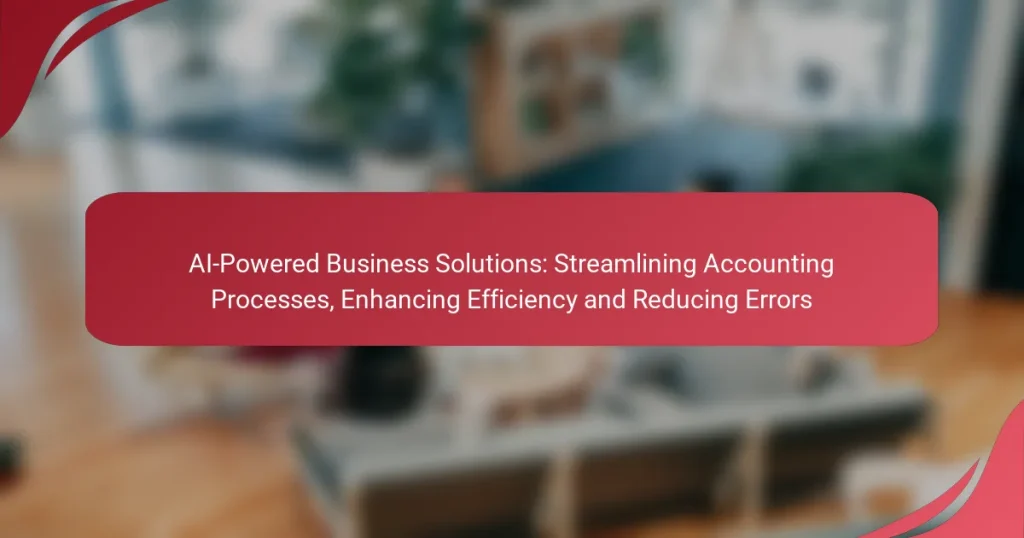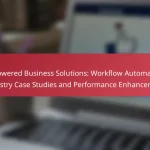AI-powered business solutions are revolutionizing accounting processes by automating repetitive tasks and enhancing accuracy. By leveraging real-time insights, businesses can improve efficiency, reduce errors, and make better financial decisions. With tools like QuickBooks Online and Xero, companies can streamline their workflows and focus on strategic growth.

How can AI streamline accounting processes in the US?
AI can significantly streamline accounting processes in the US by automating repetitive tasks, enhancing accuracy, and providing real-time insights. This leads to improved efficiency, reduced errors, and better financial decision-making for businesses.
Automated data entry
Automated data entry uses AI to capture and input financial data from various sources, such as invoices and receipts, directly into accounting systems. This reduces the time spent on manual entry and minimizes human errors, which can be costly.
For example, AI-powered tools can scan documents and extract relevant information in seconds, allowing accountants to focus on more strategic tasks. Businesses can expect to cut data entry time by up to 80% with effective automation.
Real-time financial reporting
AI enables real-time financial reporting by continuously analyzing data and generating up-to-date financial statements. This allows businesses to monitor their financial health instantaneously, facilitating timely decision-making.
With AI, companies can receive alerts about significant changes in their financial metrics, such as cash flow or expenses, enabling proactive management. This immediacy can enhance responsiveness to market conditions and operational challenges.
Predictive analytics for cash flow
Predictive analytics leverages historical data and AI algorithms to forecast future cash flow trends. This capability helps businesses anticipate financial needs and optimize their cash management strategies.
For instance, by analyzing past sales data and payment patterns, AI can predict when cash inflows are likely to occur, allowing companies to plan for expenses more effectively. This foresight can improve liquidity and reduce the risk of cash shortages.
Fraud detection capabilities
AI enhances fraud detection by analyzing transaction patterns and identifying anomalies that may indicate fraudulent activities. This proactive approach helps businesses mitigate risks and protect their financial assets.
AI systems can learn from historical fraud cases and continuously improve their detection algorithms. As a result, companies can achieve a higher accuracy rate in identifying potential fraud, which is crucial for maintaining trust and compliance.
Integration with existing software
AI solutions can seamlessly integrate with existing accounting software, enhancing their functionality without requiring a complete overhaul. This integration allows businesses to leverage AI capabilities while maintaining their current systems.
When selecting AI tools, it’s essential to ensure compatibility with existing platforms, such as QuickBooks or Xero. This approach minimizes disruption and maximizes the benefits of AI enhancements, enabling a smoother transition to more efficient accounting processes.

What are the benefits of AI in accounting?
AI in accounting offers significant advantages, including improved accuracy, reduced costs, better decision-making, and time savings. By automating routine tasks and analyzing data, AI enhances the overall efficiency of accounting processes.
Increased accuracy
AI systems minimize human error in accounting by automating data entry and calculations. This technology can process vast amounts of data with a high degree of precision, ensuring that financial reports are reliable and accurate.
For instance, AI can quickly identify discrepancies in financial records, allowing for immediate corrections. This capability not only improves data integrity but also builds trust with stakeholders.
Cost reduction
Implementing AI in accounting can lead to significant cost savings by reducing the need for extensive manual labor. Businesses can lower their operational expenses by automating repetitive tasks such as invoicing and payroll processing.
Additionally, AI can help identify cost-saving opportunities through data analysis, enabling companies to optimize their budgets. This can result in savings of tens of percent in operational costs over time.
Enhanced decision-making
AI provides valuable insights by analyzing financial data and trends, allowing businesses to make informed decisions. With predictive analytics, companies can forecast future financial performance and adjust strategies accordingly.
For example, AI can analyze market trends and customer behavior, helping businesses to identify new revenue opportunities or areas for improvement. This data-driven approach enhances strategic planning and resource allocation.
Time savings
AI significantly reduces the time spent on routine accounting tasks, freeing up professionals to focus on more strategic activities. Tasks that once took hours can now be completed in minutes, improving overall productivity.
For instance, automated reconciliation processes can take just a few minutes instead of days, allowing accountants to dedicate their time to analysis and advisory roles. This shift not only enhances efficiency but also increases job satisfaction among accounting staff.

Which AI tools are best for accounting?
Several AI tools can significantly enhance accounting processes by automating tasks, improving accuracy, and streamlining workflows. Popular options include QuickBooks Online, Xero, FreshBooks, and Zoho Books, each offering unique features tailored to different business needs.
QuickBooks Online
QuickBooks Online is a widely used accounting software that leverages AI to automate invoicing, expense tracking, and financial reporting. Its user-friendly interface allows businesses to manage their finances efficiently, with features like bank reconciliation and real-time reporting.
Consider its tiered pricing plans, which range from basic to advanced features, making it suitable for small to medium-sized businesses. QuickBooks Online also integrates with numerous third-party applications, enhancing its functionality.
Xero
Xero is another robust accounting solution that offers AI-driven features such as automatic bank feeds and smart reconciliation. This cloud-based platform is designed for small businesses and provides a comprehensive overview of financial health through customizable dashboards.
Xero’s pricing is competitive, with plans that cater to varying business sizes and needs. It also supports multi-currency transactions, making it a good choice for businesses operating internationally.
FreshBooks
FreshBooks is tailored for service-based businesses, focusing on invoicing and time tracking. Its AI capabilities help automate billing processes and generate reports, allowing users to spend less time on administrative tasks and more on client work.
FreshBooks offers a straightforward pricing model with several tiers, making it accessible for freelancers and small businesses. Its intuitive design and mobile app facilitate easy access to financial data on the go.
Zoho Books
Zoho Books is part of the larger Zoho suite and provides a comprehensive accounting solution with AI features for automating workflows and improving accuracy. It includes functionalities like invoice generation, expense tracking, and tax compliance, making it suitable for small to medium enterprises.
Pricing for Zoho Books is competitive, with plans that scale according to the number of users and features needed. Its integration with other Zoho applications enhances its utility for businesses already using the Zoho ecosystem.

How to choose the right AI accounting solution?
Choosing the right AI accounting solution involves assessing your business’s specific needs, ensuring compatibility with existing systems, and prioritizing user experience. A well-selected solution can significantly improve efficiency, reduce errors, and streamline accounting processes.
Assess business size and needs
Understanding your business size and specific accounting requirements is crucial in selecting an AI solution. Smaller businesses may benefit from simpler, cost-effective tools, while larger enterprises might require more robust systems capable of handling complex transactions and multiple currencies.
Consider the volume of transactions, the number of users, and the specific features you need, such as invoicing, payroll, or tax compliance. A solution that scales with your business growth can save you from frequent upgrades and disruptions.
Evaluate integration capabilities
Integration capabilities are essential for ensuring that your AI accounting solution works seamlessly with existing software. Check if the solution can connect with your current systems, such as ERP, CRM, or payment platforms, to avoid data silos and manual entry errors.
Look for solutions that offer APIs or pre-built integrations with popular software. This can significantly reduce implementation time and enhance data accuracy across your business operations.
Consider user experience
User experience plays a vital role in the successful adoption of an AI accounting solution. A user-friendly interface can reduce training time and improve employee satisfaction. Prioritize solutions that offer intuitive navigation, clear dashboards, and accessible support resources.
Gather feedback from potential users during the evaluation process. Conducting trial runs or demos can help identify which solution aligns best with your team’s workflow and preferences, ensuring smoother implementation and ongoing use.

What are common challenges with AI in accounting?
AI in accounting faces several challenges, including data privacy concerns, integration with existing systems, and the need for quality data. These issues can hinder the effectiveness of AI solutions and require careful consideration to mitigate risks and enhance performance.
Data privacy concerns
Data privacy is a significant challenge when implementing AI in accounting. Financial data is sensitive, and organizations must ensure compliance with regulations such as GDPR in Europe or CCPA in California. Failing to protect this information can lead to severe legal repercussions and loss of customer trust.
To address data privacy concerns, businesses should implement robust encryption methods and access controls. Regular audits can help identify vulnerabilities and ensure that data handling practices align with legal requirements. Additionally, training employees on data privacy best practices is essential to minimize human error.
Consider using AI solutions that prioritize data security and offer transparent privacy policies. Look for vendors that provide clear information about how they handle data and comply with relevant regulations, ensuring that your organization remains compliant while leveraging AI capabilities.


